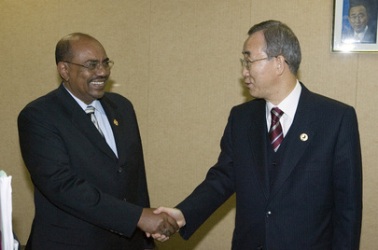UN welcomes direct talks between Khartoum, SPLM-N rebels
March 22, 2013 (KHARTOUM) – The United Nation Secretary-General, Ban Ki-Moon has welcomed the decision by the Sudanese government and its southern rebels (SPLM/N) to meet for direct talks, which seeks an end to the newly two-year conflict.

The cooperation agreement with South Sudan, the minister stressed, paves way for negotiations between Sudan and the SPLM-N rebels, and confirmed Khartoum’s new position that it is “ready to negotiate with the SPLM-N”, but only based on the 2005 Comprehensive Peace Agreement (CPA).
The Secretary-General, in a statement, urges immediate cessation of hostilities to allow the safe delivery of humanitarian assistance and create a conducive atmosphere for political discussions to address the root causes of the conflict.
Sudan has been strongly resisting regional and international pressure to negotiate with SPLM-N rebels, calling its leaders outlaws and issuing arrest warrants for them.
The SPLM-N fought alongside the South during its protracted civil war with the north, with conflict flaring in 2011 between Khartoum and rebels fighting for the removal of the Arab-dominated regime.
South Sudan armed and trained SPLM-N when it was part of the South’s rebel force, but maintains it cut all military ties before its independence in July 2011.
The United Nations Security Council (UNSC) resolution issued in May 2012 ordered Sudan and the SPLM-N to cooperate in order to end the conflict in the two regions.
Under the resolution, the two parties are supposed to negotiate on the basis of the 28 June 2011 agreement they signed in Addis Ababa before it was scrapped by Sudanese president Omer Hassan Al-Bashir.
The development comes days after the two Sudans agreed to form a new mechanism to deal with accusations of supporting or harbouring of rebel groups in the two countries.
The African Union High Level Implementation (AUHIP) had convened a two day meeting on 18-19 March for the Joint Political and Security Mechanism (JPSM) to discuss the effective withdrawal of troops as it was agreed earlier this month, but also tackle additional committees to implement other security measures they agreed last year.
The two parties, according to an AUHIP communiqué, agreed to form “a joint committee to be mandated to deal with any concern and complaints may constitute a violation to the MOU on Non Aggression and Cooperation of 14th February 2012, as well as the Mutual Cooperation Agreement of 27th September 2012.”
Sudan and South Sudan have often traded accusations of supporting and harbouring rebel groups from both sides. The mistrust between the two sides prevented the implementation of any deal they reached in the past particularly the Cooperation Agreement of 27 September 2012.
However, resolutions from the recent meeting, paves way for the two sides to seriously handle the mutual accusations support to rebel groups, providing a remedy to end the conflict in the Blue Nile and South Kordofan.
Meanwhile, both two countries have been tasked to prepare proposals on the formation of this committee, its term of references, which will be discussed during the next extraordinary JPSM meeting at a date, yet to be fixed.
(ST)
